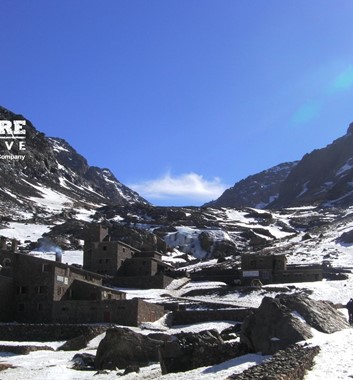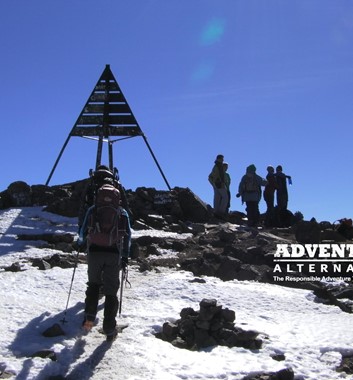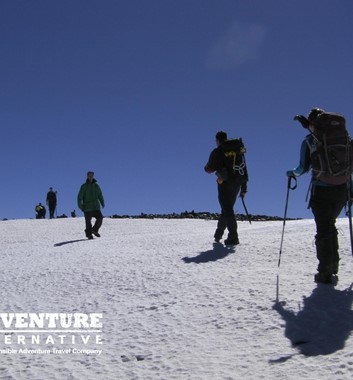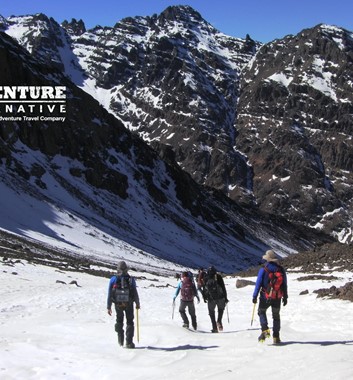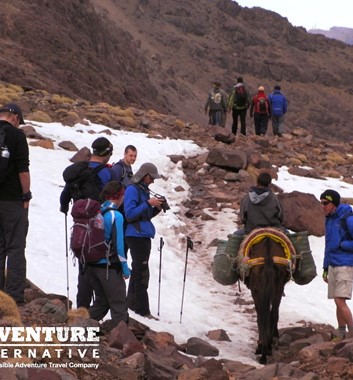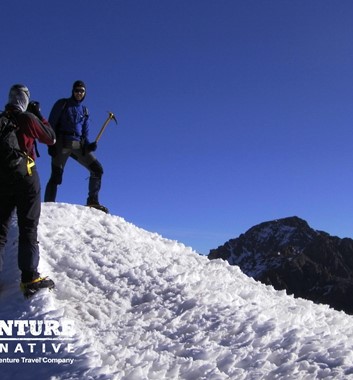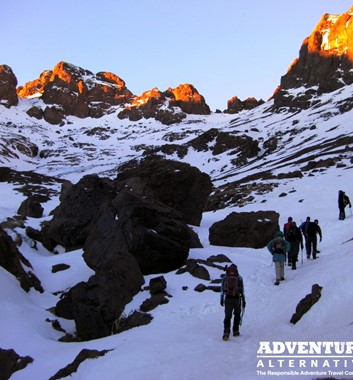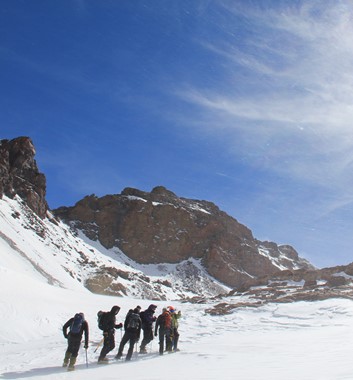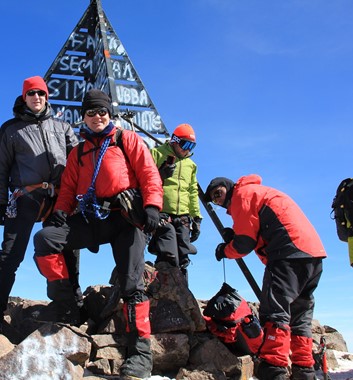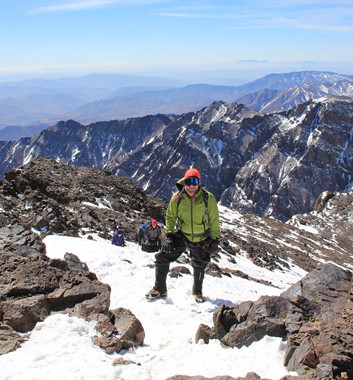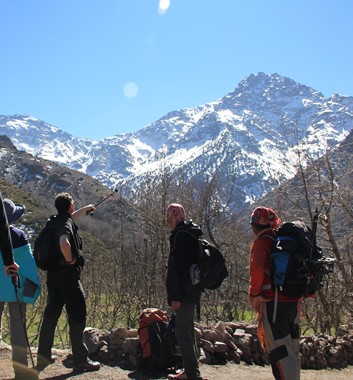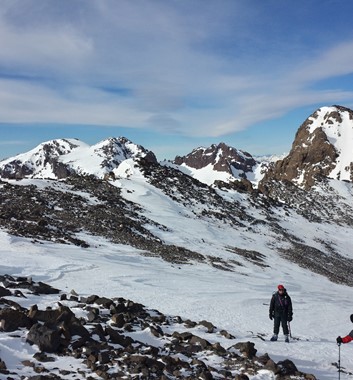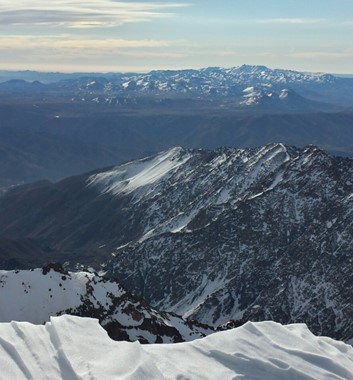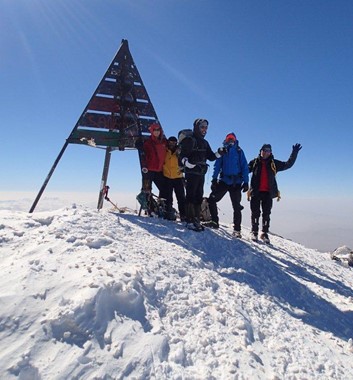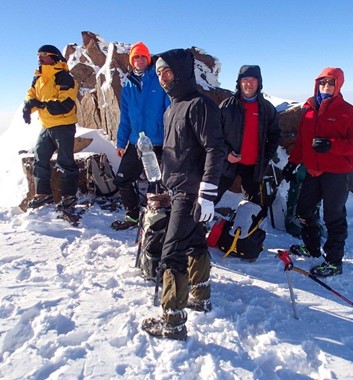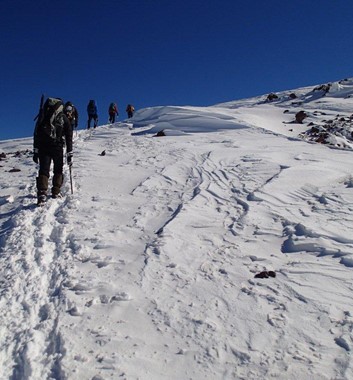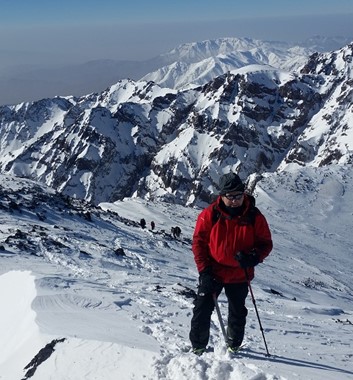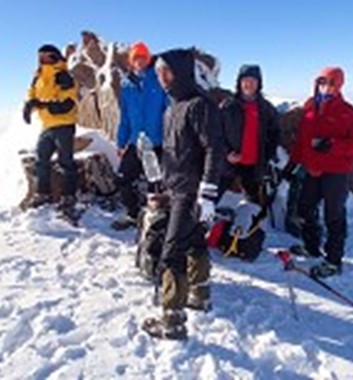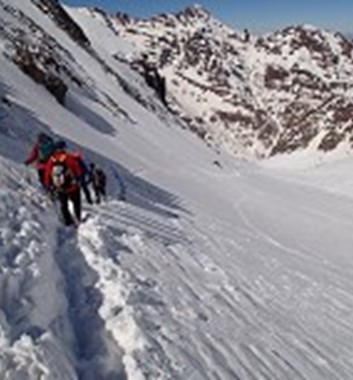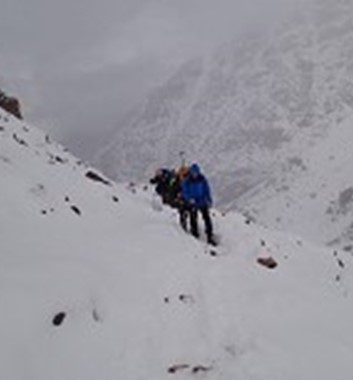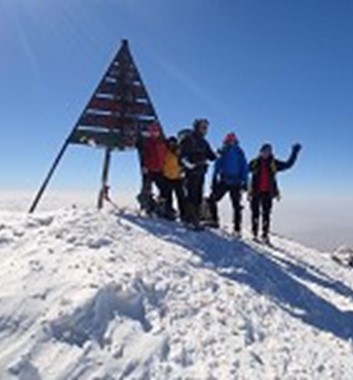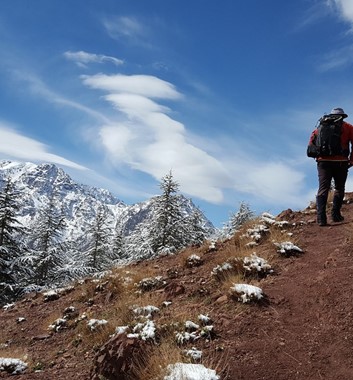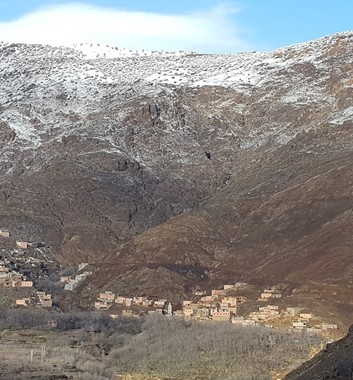Overview
This is a wonderful winter mountain trek to the summit of Toubkal which is also a great learning experience for winter skills. We normally run two trips each month over winter and our groups average four to six people. The aim of the trip is not only to summit the mountain but to learn alpine skills which can be applied to other mountain trips.
Skills learnt include moving safely on snow covered ground in winter conditions, using equipment such as crampons, walking axe, harness and rope, moving at high altitude and reading the terrain for objective dangers. The aim is to reach a level of competency and confidence for winter walking and to summit the highest peak in north Africa.
Every February we run a special Winter Skills climb of Mt Toubkal, which is personally guided by Adventure Alternative founder and head high altitude guide, Gavin Bate. Alongside the fantastic climb, the trip also includes training days that will teach you all the practical skills that you’ll need to climb other peaks such as Mt Elbrus, or Himalayan peaks such as Island Peak, Mera Peak, or S. America's Aconcagua in the future and also includes remote emergency care and first aid training. Gavin is a great person to climb with and learn from, he has a lifetime of experience from all over the globe from the depths of Lowes Gully in Borneo, to the lofty heights of Mt Everest’s summit and has many humorous tales to keep everyone entertained. The cost for the February climb and Winter Skills package is £745 per person and is limited in group size.
Climbing Toubkal is a great non-technical short break in the Atlas mountains, only around 50 miles to the south of Marrakech. On a clear day, the range can be clearly seen from the city. The blue skies, bright sun and crisp snowy peaks are a wonderful antidote to the winter of northern Europe.
These winter climbs require additional mountaineering equipment such as crampons and a walking axe, helmet, slings, karabiners and a harness which we can provide for rent. Mount Toubkal at 4167 metres is not a technical peak but nevertheless it is a winter expedition and it can be very cold and there is a lot of snow and potential risks. It's important to be well prepared.
"Just dropping a mail to sincerely thank you & your company for the trip to Mt Toubkal. It was a fantastic experience that I thoroughly enjoyed all round. It was my first trekking trip abroad so I was not sure what to expect. The hospitality, local knowledge, food, guidance, training & courtesy we received was top class. Give a shout out to your employees Rosie & Chris who offered a professional response to any queries I had prior to the trip. I would recommend Adventure Alternative to anyone wishing to go on the trip of a lifetime. You can quote me on that!" (J. Colcannon, Galway, Ireland)
Winter itinerary
| Day | Activity |
| 1 | Arrive Marrakech, go to the hotel and explore the medina, dining out in town |
| 2 | Drive Marrakech to Imlil and go to the local riad, acclimatisation walk up to 3000m |
| 3 | Trek from Imlil to Toubkal Refuge, using mules and porters for bags |
| 4 | Acclimatisation and training on snow |
| 5 | Jebel Toubkal (4167m) climb |
| 6 | Trek back to Imlil and riad for local dinner and celebrations |
| 7 |
Drive to Marrakech for lunch and then depart for home or optional days in Morocco. Contact us for options |
How much does it cost to climb Toubkal?
We charge £695.00 for a guided climb which is all-inclusive, no kitties. There are a few extras like snacks you can buy in the mountain hut plus meals in Marrakech.
How fit and experienced do you need to be?
You do not need to be super-fit for this trip, however, the climbs are fairly demanding with some long days of sustained walking with a backpack. The effects of altitude may also further tax your body. You will enjoy the trip all the more if you are in good physical shape having exercised regularly leading up to the trip. Sometimes the weather can be quite extreme and it is hard work trekking up the valley and to the top in deep snow or on hardpack or ice. It's certainly a good idea to work on thigh and calf muscles and be used to carry a day pack with at least 10 kgs.
The climb will require the use of crampons, ice axe and possibly a safety rope for some sections, it is preferable to have prior experience using them but this is not essential as training is provided. By the end of the trip, you will feel comfortable and confident in their use and the trip is, in fact, a good learning trip with guides to help and good equipment and clothing to rely on. Want more info? See our trip prep page.
What is the route like?
The trek from Imlil to the Refuge is on a well-established path over rocky ground which is snow-covered and icy. It winds its way up the valley and is generally of a gentle gradient. Initially, you can walk in trekking boots but at the snowline, it will be better to put on bigger mountain boots that can take crampons if they are needed in the higher part of the valley. The mules will go as far as the snowline but if there is deep snow then we use porters all the way.
The ascents of Toubkal South Cwm is graded F meaning facile (easy) and Toubkal North Cwm F+ which is occasionally an option for the descent. Mount Toubkal in winter is beautiful but is also challenging and can be cold and windy. The snow can be very deep or it can be very icy, especially in the early morning, so it will be important to be well equipped for a winter climb and fit for the day.
The difficulty of the route is greatly determined by weather and snow conditions, acclimatisation and general fitness. The itinerary has been planned to allow a gradual increase in altitude so that all the objectives are achievable by a moderately fit person with good co-ordination and experience of mountain terrain.
Some parts of the climbs will involve ascending, traversing or descending snow slopes of up to around 30 degrees. Subject to conditions, this is easily achievable using crampons and with guides cutting or stomping steps where required. It will, however, need confidence and concentration in places, including taking direction from guides and leaders.
Daily routine on the Toubkal mountain trek
In line with good mountaineering practice, we will be starting our climbs from the refuge early and acclimatising slowly. We will have plenty of breakfast and hot drinks before leaving the refuge and snacks for the summit or one of our rest stops. We will usually be back at the refuge by early afternoon, at which time we will have a full cooked lunch. There will be time to relax and socialise at the refuge before dinner at around 7 pm. As we are usually making early starts we inevitably go off to bed fairly early, however, there is a fire in the communal area and guests are welcome to stay there until later in the evening.
What to wear on Toubkal in winter
From Marrakech to over 4000m on the top of Toubkal, there is a big change in temperature. Be prepared for very cold conditions with rain low down and snow up high. Expect as low as minus 15 Celsius on summit day in the morning with the windchill.
Clothing needs to be adaptable and suited to winter conditions, and the best way to achieve this is through a layering system with a good base layer, several mid-layers of fleece, an outer shell and a proper down jacket. For extremities and your head, you need good quality gloves, mitts and a warm hat. You will also need sunglasses and goggles because there is a good chance of whiteout.
It could also be very hot and sunny with plenty of UV reflection from the snow, so also take proper sun protection and a sunhat. It is likely that you will leave the refuge for the summit trek with trekking trousers over-trousers, a base layer, warm mid-layer, soft-shell or fleece jacket, windproof layer, hats, gloves and mitts. Down jacket and goggles will be in your day pack along with a flask of hot drink and bottle of water for later, snacks, sunglasses and camera. The daysack needs to be about 40 litres and your main gear can be carried in a duffle bag with all kit in waterproof sacks.
We have a full kit list for both winter and summer treks on Toubkal, but in summary:
- BAGS - Large rucksack or duffle ~80 litres (for a porter to carry) plus a medium daypack ~40L (carried by you)
- SHELL - Top and bottom wind/rainproof
- INSULATION - Fleece tops and jacket, warm trousers and a down jacket, hats, gloves and mitts, warm socks
- BASE LAYER - Thin layer to wick away sweat and to strip down to when it gets hot
- FEET - Crampon compatible boots (B2 or B3) and trekking boots, plus hut shoes
- CLIMBING - Crampons, walking poles, walking axe, harness, sling and some screwgate karabiners, helmet
- SLEEPING - 3 or 4 season sleeping bag (the Refuge can be warm with a full dormitory!)
- EATING/DRINKING - Thermos for hot drinks, water bottle and favourite snacks
- PERSONAL - Wash kit and personal first aid kit, sunglasses, suncream, lip cream, towel, headtorch, powerpack for electronics
You can rent climbing equipment directly from us in the UK or from local companies in Imlil but the selection there is quite old and limited. Axes and poles are easy to find, but fewer places rent harnesses, slings or karabiners.
We definitely do recommend walking poles, they are particularly useful on this trip. Taking a helmet is preferable, there is a danger of a head injury if you slipped and fell.
Mountain guides on Toubkal
Our Moroccan guides and staff provide a wonderful opportunity to understand what life in the Berber mountain communities is like and they speak good English and will provide the necessary training for a winter experience.
Location and culture
Situated in the North-west corner of Africa, Morocco is a land of great contrasts from the white-washed houses on the fertile Mediterranean coast to the arid brown mountains, which are snow-capped during winter. Mount Toubkal is the highest peak in the country.
The gateway to the mountains is Marrakech, the red city, and Morocco's fourth largest with a population of around one and a half million. You can explore this ancient city with its exotic souks, palaces, gardens and heaving mass of dust, noise and colour. We stay in a lovely local riad run by a French couple who moved to Morocco from the Alps twenty years ago. In the evening there are plenty of places to eat and explore.
Morocco will feel a world away from northern Europe, not least because northern Europe is still in the midst of winter. In Marrakech, you will usually enjoy clear blue skies, temperatures of 20-30 degrees and enough sunlight to sunburn the unwary within the hour. The snow-clad summits of the High Atlas provide a wonderful back-drop to the ochre-coloured buildings of the city.
In comparison with more popular trekking and climbing areas in the Alps, the Atlas Mountains are quiet in terms of tourism. You can see something of the traditional Berber way of life and have an appreciation of what a magnificent wilderness area this is. On the mountain itself, we stay in the mountain refuge which has visitors from all over the world to stand on the top of the Atlas range and enjoy the spectacular views.
Why us?
Our Mount Toubkal trek is designed to give you the maximum from your week away in Morocco, including:
- Training in winter mountain skills and techniques
- A good rate of acclimatisation to altitude.
- Knowledgeable advice from our qualified staff from the moment you make an enquiry
- Local employment that is fair and responsible
Dates & Bookings
Itinerary
Toubkal winter itinerary
| Day | Elevation | Travel Time | Info |
|---|---|---|---|
| 1 | 450m | Arrive on international flight into Marrakech, and transport with our staff into town. There will be time to explore the city souks and the famous Jamaaa El Fna Square before a team dinner in the evening. We spend the night in a traditional and comfortable city riad. | |
| 2 | 1850m | 1.5-2 hrs | After breakfast we have around a 3 hour transfer directly south toward the Atlas mountain peaks. In Imlil you can stay in a local homestay owned by our staff or opt to take a room in the beautiful Kasbah du Toubkal. After lunch we go for a walk round the town and pick up any rental gear that people may need. |
| 3 | 3207m | 5-7 hrs | After breakfast we trek up the valley to a small shrine and buildings of Sidi Chamharouch at the foot of a steepening of the trail and narrowing of the valley. From here we wind further up the Isougouane valley to the Nelter Refuge at the foot of the main west face of Toubkal and surrounded by a cirque of peaks. |
| 4 | 4088m | 7-8 hrs | Today we walk up the valley towards the peak of Ouanoukrim. The mountain is Toubkal's neighbour and the second highest peak in the Atlas Mountains. First we climb the remainder of the Isougouane valley, perhaps up to the narrow but impressive col of Tizi n'Ouagane, with views out and down to the next valley. Weather may dictate that we try to climb Toubkal itself on this day but the preference will be to spend this day acclimatising to around 4000m and sleeping back at the refuge for a second night. |
| 5 | 4167m | 8 - 9 hrs |
Ascent of Toubkal. We traverse and ascend the south facing cwm over mixed ground of snow, ice and rock, through various undulations and bowls. Eventually we emerge out into the sunlight at the col of Tizi n Toubkal at 3940m. From here we move up along the SW ridge and a little higher up get a spectacular view of the SE face of Toubkal and the black triangle of the summit trig point. Our steady acclimitisation over the last two days, and in particular our ascent to over 4000m the day before will pay dividends here as we pass other climbers on shorter programmes as they wheeze their way up the final slopes! After enjoying the views at the summit we will make our way over to the North cwm for our descent. This is a less used route but allows a very satisfying traverse of the summit and allows us to see more than twice as much of the mountain. The descent is fairly steep but easy to complete in crampons. Eventually, we emerge out into the main Isougouane from behind a spur and make our way around to the refuge. |
| 6 | 4.5 hrs | This morning is a possible second option for climbing Toubkal but we have to get back to Imlil so most people rest in the morning and then pack up and head back down the valley to get to the riad for a shower and celebratory meal. | |
| 7 | 450m | 1.5-2 hrs | After breakfast we head back down the valleys to Marrakech, possibly stopping for tea and cakes at the rather swish Kasbah run by Richard Branson. We should be in Marrakech in time for lunch leaving the rest of the day free to explore or for an evening flight. Return flights should be booked for departure no earlier than 14:00 to give us time to get back down from the mountains. Some people wish to stay longer in Marrakech to enioy this famous city. |
Cost
Mount Toubkal winter trek cost £695.00
Includes:
- Accommodation in Marrakech and in Imlil - a nice riad in the city and a local guesthouse in the mountains
- Accommodation in the Nelter Refuge at the base of the mountain - dormitory with bunks
- All meals and hot drinks during the trip
- Mules to transport the main bags to the mountain refuge and back
- Mountain guides, cook and porters - some trips will have a UK mountain guide
- Transportation to and from Imlil and airport transfers
- Group equipment - safety and medical kits
Excludes:
- International air fare to Marrakech
- Travel insurance
- Meals in Marrakech (meals cost an average of about £10-£15, depending on the exchange rate)
- Mineral water, soft drinks, snacks and showers in the refuge. There is also a small donation for firewood.
- Kit rental - either from our UK office or locally
Winter Skills Mt Toubkal Expedition
Every year we run a special Winter Skills climb of Mt Toubkal in February, which is personally guided by Adventure Alternative founder and head high altitude guide, Gavin Bate. Alongside the fantastic climb, the trip also includes training days that will teach you all the practical skills that you’ll need to climb other peaks such as Mt Elbrus, or the Himalayan peaks (Island Peak, Mera Peak), or Aconcagua in the future and also includes remote emergency care and first aid training. Gavin is a great person to climb with and learn from, he has a lifetime of experience from all over the globe from the depths of Lowes Gully in Borneo, to the lofty heights of Mt Everest’s summit and has many humorous tales to keep everyone entertained. The cost for the February climb and Winter Skills package is £745 per person and is limited in group size.
Payments
A deposit of £100 is required on booking to secure your place and we ask that the remaining balance (trip price minus the deposit) is paid in full 6 weeks prior to your departure.
Travel Insurance
It is important that you take out adequate personal travel insurance for the activities on this trip. Please see our information page in the menu to the right for further guidance and suggestions. If you have any questions regarding the required coverage please do not hesitate to contact us.
Local Providers in Morocco
We use a local company run by our friends Ahmed and Ibrahim for providing transport, mules and staff. They have signed up to the Adventure Alternative code of conduct and have been working with us since 2010. We have used the same guides for a long time and often our trips are led by a UK guide.
Photos
Extras

Extra nights
Double room in the Riad Chala or Riad Marrakech in the centre of the city. Bed and breakfast.
Choose a scheduled date or contact us to set up private dates or a bespoke itinerary. The minimum deposit is £100.00 and the balance is due four weeks before travel.
- Duration 8 days
- Numbers 10
- Altitude 4167m
- Challenge Moderate
- Comfort Riad, Mountain refuge


